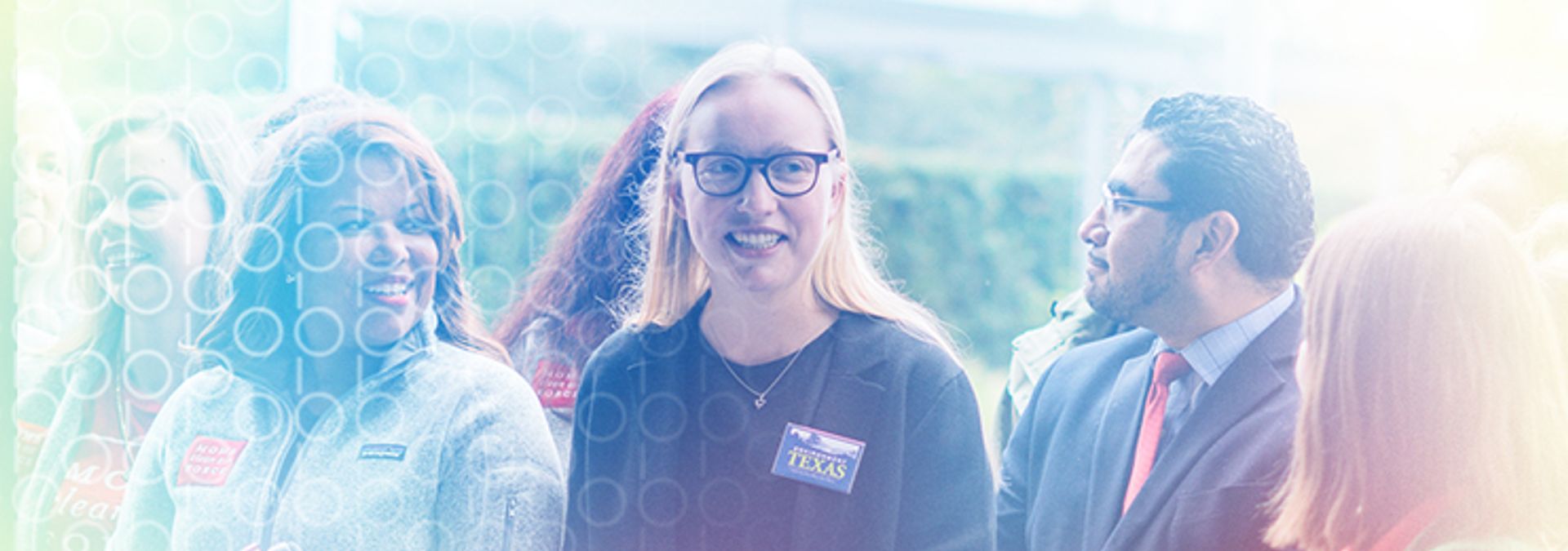
'It is our future': A conversation with Catherine Fraser
Catherine Fraser is a Clean Air Associate with Environment Texas. Photo: Alese Pickering.
Catherine Fraser remembers the first time she heard about climate change. Not even a teenager, she went with her mother to the home of some family friends in Minnesota to hear from the Arctic explorer Will Steger.
He was showing photographs and telling the room about the dramatic changes he’d tracked in temperature and ice cover.
“I had never heard of climate change before,” Fraser says. “I was obsessed for awhile, because I realized that, in my hometown, no one else my age, let alone many of the adults, believed in climate change.”
Now, she is making it her life’s work. After graduating from Colby College in Maine, she moved to Texas to become a Clean Air Associate with Environment Texas. In December, she testified alongside Port Neches residents who had driven all the way to Austin to urge the Texas Commission on Environmental Quality to take stronger action against the TPC plant that exploded the day before Thanksgiving, causing widespread evacuations and a month of leaked pollutants, including cancer-causing butadiene.
“Texans are sick and tired of oil refineries and petrochemical plants catching fire, exploding and pumping out harmful pollution,” Fraser said that day to TCEQ’s commissioners. “We need our state leaders to crack down on illegal pollution, and stop putting the interests of polluters over the rest of us."
This conversation has been edited and condensed for clarity.
Allyn West: Technically, you are a young person! I wanted to ask you about that. What does it mean to you to be doing this work as a young person in the midst of a substantial global movement that young people like you, in many ways, are the faces of?
Catherine Fraser: Being a young person at this time is fascinating. The Sunrise Movement, I think, changed the game on how people talk about climate change. And it’s exciting to see the collaboration across groups.
Though I'm fairly new to environmental work in Texas and Houston, I’m seeing that there's a lot of movement.
But someone from a small town in Minnesota who went to college in Maine just doesn’t see industry to the degree we see in Texas. I remember learning about case studies along the Gulf Coast, hearing about industrial facilities and people living in cancer corridors, discovering that they've been living next to a toxic facility for years and not knowing it, and being outraged by that.
Since I moved to Texas, we've seen this epidemic of devastating chemical disasters in the Houston area, and I've learned that it's not really a matter of if there will be another disaster, but when. There’s a real anxiety about that.
It does feel like it is our future. I've seen a growing consciousness of that among my peers. It's interesting to be at the time in your life when you're graduating college, and you're trying to plan out your life or think about the next few years. People are factoring it in. We can no longer ignore it.
AW: The disasters are one thing. But most of us don’t know that we are living with air that’s not healthy a lot of the time. Your new report makes clear that the concept of “good enough” air quality is just not good enough.
CF: We found in our “Trouble in the Air” report that there were 110 days where Houston ends up breathing unsafe air. That's just over three months’ worth.
We've seen significant progress, but it's clear that we still have a problem, and we still have a long way to go. It's interesting, because in Houston, on some days when it's smoggy, you can tell that there's pollution, but maybe people are accustomed to that. You can't always see air pollution.
It’s a funny thing. I actually developed asthma in college. I've been an athlete my whole life, and I played soccer in college. One year, we were training indoors, and I was having trouble breathing. I was wheezing, and I couldn't understand what was going on, because I'd never had problems like this.
But it turns out I had developed asthma. I didn't know that that was a thing. I don't smoke, and I was in good shape. Now that I have it, I can often identify when there is an allergen in the air or when we are having an ozone action day, because I’ll be having more trouble breathing.
That was a wake-up call for me, realizing that a change in what you're breathing day to day, even though I'm not seeing that I'm breathing in particles or dust, can have a significant effect on your health.
In college, I had a lot of great professors, including one who argues that a great way to talk about climate and the environment is through health, because it affects everyone. It’s more tangible than watching the glaciers melt or talking about sea level rise. Everyone can relate.
AW: How do you avoid feeling powerless? That’s one of the goals with Neighborhood Witness — helping people take action?
CF: So, when you sign up for Neighborhood Witness, you receive illegal air pollution email alerts when an industrial facility in your community violates its permits. Then, you can report polluters to TCEQ.
It’s intended to empower Texans to be able to know what's going on in their community, and it’s a way to encourage TCEQ to do their job and make sure that illegal events don't keep happening, that petrochemical facilities are regulated enough so we're not seeing the disasters and fires that are harming our communities.
Obviously, we get air pollution from a number of sources, but in Houston, a large share is from industry. Once I signed up for email alerts from Neighborhood Witness, and I was seeing how often industrial facilities are illegally polluting the air — not even everyday pollution that’s “allowed” — I realized that we have to stop the idea that that’s normal, because it’s a problem, though we may not see it everyday.
Neighborhood Witness is trying to bring you into the movement and allow you to be your own activist and advocate for clean air.
I've given a few presentations now to super neighborhood groups, and people say they are grateful that we have this tool, so they can have information and act on it and feel like they have some power.
This was particularly striking at the presentation I recently gave to the Kashmere Gardens Super Neighborhood. There, they just found the cancer cluster in their neighborhood, which they had suspected, but didn't have confirmed.
Since that discovery, it seems as though there's a feeling in the community that they don't have accessto enough information.
Talking to some of those community members about Neighborhood Witness, I was feeling that it could present a way for them to know what's going on, know more about what's in the air they breathe, know if these companies are violating their permits and emitting illegal amounts of pollution.
Then they would be able to speak truth to people in power in order to ensure they receive the justice they deserve and ask state and local officials to take action and make sure companies are being good neighbors.
West is a senior communications specialist for the Environmental Defense Fund. You can follow him on Instagram and Twitter @allynwest.
STAY UP TO DATE
The quality of our newsletter is considered satisfactory and poses little or no risk.
SUBSCRIBE

